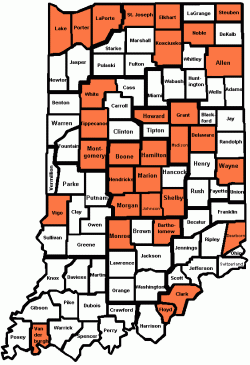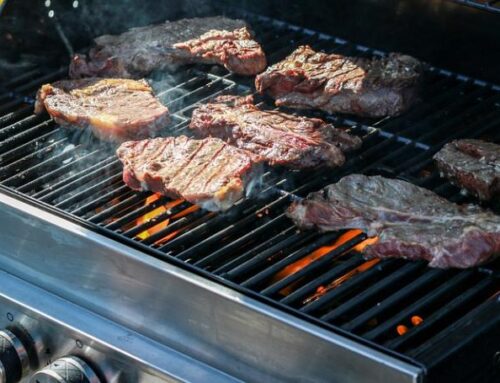Your Indiana Lawyer Bill Hurst
The choice of what court to bring a personal injury lawsuit in Indiana is governed by Trial Rule 75(A)-Venue. The rule gives 9 different venues that qualify as a “preferred venue” and a 10th option if (1)-(9) do not apply to the situation. “An Indiana Plaintiff may elect to bring suit in any county meeting the criteria listed in Trial Rule 75(A)(1)-(9), and each such county is a county of preferred venue. Among the counties in which preferred venue lies, no preference is given to one county over another”. Grove v. Thomas, 446 N.E.2d 641, 642 (Ind. Ct. App. 1983).
Indiana Venue Statute
Indiana T.R. 75(A)(1)-(9) are summarized as follows:
- Trial Rule 75(A)(1) the county where the greatest percentage of defendants resides, or, if there is no such greater percentage, the place where any individual defendant resides.
- Trial Rule 75(A)(2) the county where the land or chattels or some part thereof are regularly located or kept if the complaint includes a claim for injuries thereto or relating to such land or such chattels. There has been discussion as to whether this language allows for preferred venue in the county where an automobile involved in the crash was stored. The Indiana court of appeals in Grove v. Thomas, 446 N.E.2d 641, 643 (Ind. Ct. App. 1983) held that this language did indeed included that county as a preferred venue so long as “the complaint includes a claim for injuries to those chattels [the car].” Other cases have addressed personal items of property within a car which receive damage (but no claim for damage to the car itself) and were not found to establish preferred venue where those items are regularly located. R & D Transp., Inc. v. A.H., 859 N.E.2d 332 (Ind. 2006). Indiana case law states that the relevance of the location to the accident must be looked at. Id. (Discussed in more detail below)
- Trial Rule 75(A)(3) the county where the accident or collision occurred, if the complaint includes a claim for injuries relating to the operation of a motor vehicle. It should be remembered when considering this section that both accident location as well as storage place of an automobile involved in the accident could both be viable.
- Trial Rule 75(A)(4) the county where either the office of a defendant organization is located if such organizations or individuals are included as defendants in the complaint. This can be relevant to under or uninsured motorist carriers/insurance companies.
- Trial Rule 75(A)(5) the county where the plaintiffs reside, the principal office of a governmental organization is located, or the office of a governmental organization to which the claim relates is located, if one or more governmental organizations are included as defendants in the complaint. To use this subsection, a governmental organization must be involved!
- Trial Rule 75(A)(6) the county or court fixed by written stipulations signed by all the parties and filed with the court before ruling on the motion to dismiss.
- Trial Rule 75(A)(7) the county where the individual is held in custody or is restrained, if the complaint seeks to have the individual freed.
- Trial Rule 75(A)(8) the county demanded or recommended by any statute.
- Trial Rule 75(A)(9) the county where all or some of the property is located or can be found if the case seeks only judgment in rem against the property of a defendant being served by publication.
T.R. 75(A)(10) is for a special circumstance.
- Trial Rule 75(A)(10) the county where either one or more individual plaintiffs reside, the principal office of any plaintiff organization or governmental organization is located, or the office of any such plaintiff organization or governmental organization to which the claim relates or out of which the claim arose is located, if the case is not subject to the requirements of subsections (1) through (9) of this subdivision or if all the defendants are nonresident individuals or nonresident organizations without a principal office in the state.
Does T.R. 75(A)(2) include Damage To A Vehicle Involved In The Collision?
The most interesting and often used subsection of the Indiana venue statute is subsection (2) which covers locations where land or chattels are housed. Since the 1983 case of Grove v. Thomas Plaintiffs have used this subsection to assist in causing venue to lie in the county where the Plaintiff resides (when the accident caused damages to Plaintiff’s auto), since an automobile is typically housed at the Plaintiff’s residence. The 2006 case of R & D Transp., Inc. v. A.H. repealed prior cases which attempted to do this with personal property, damaged in a collision but owned and kept by the Plaintiff at their residence. An issue which arises is did this case overrule the 1983 case of Grove v. Thomas? The writer of this article believes that it did not. The court in R & D Transp., Inc. relied heavily on the conclusion that the location at which the personal property was kept played no role in the accident or the claim. This basis makes the facts of the case supremely important. The R & D Transp., Inc. case dealt with small items of personal property (e.g. orthotic devices). In cases such as Grove, damage was done to the automobile itself. The venue where a vehicle is housed can be viewed as more important than the venue where a small item of personal property is housed (e.g. maintenance and repair of the vehicle is typically done near where the vehicle is housed). Additionally, the R & D Transp., Inc. court explicitly named several cases which its holding was meant to overrule. All of the named cases involved personal property damaged within a vehicle; none of the cases had damage to the vehicle itself. Grove v. Thomas was not named in that list.
Other Considerations Including Convenience Of The Forum
As a further factor to help determine preferred venue under T.R. 75(A), the Indiana Supreme Court has advocated “adherence to the spirit of convenience underlying the venue rules, rather than an examination of the technical language.” Randolph County v. Chamness, 879 N.E.2d 555, 558 (Ind. 2008). In Randolph County v Chamness, the Indiana Supreme Court required the convenience to the court and parties trying the case to be considered when establishing preferred venue. “Preferred venue is located in counties where information is readily available, where relevant land and personal property can be found, where witnesses can be easily brought to court, and where the litigants reside or hold office.” Randolph County v. Chamness, 879 N.E.2d 555, 557 (Ind. 2008).





